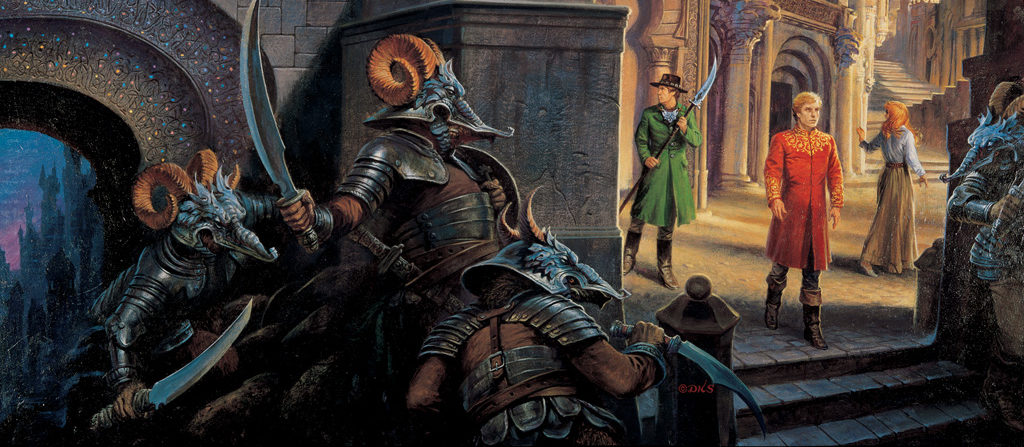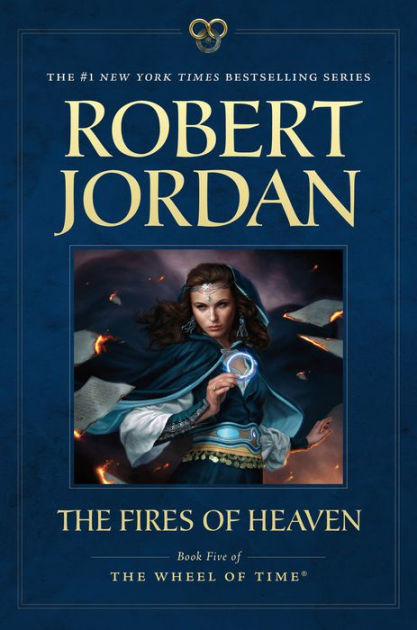

“The oak fought the wind and was broken, the willow bent when it must and survived.”
I completely understand why so many people burn out on The Wheel of Time, because I am burnt out on The Wheel of Time. Robert Jordan is the polar opposite of an efficient writer. He can drag a sentence into a paragraph, a paragraph into a chapter, and a chapter into a book. That’s an exaggeration, of course, but basically sums up how I feel about the series so far—decent ideas kneecapped by sloppy execution and bland, fluffy writing. It’s an epic fantasy series only if you find the endless repetition of trivial details to be epic. I don’t, so, for the most part, I find Jordan’s writing style to be tiresome. He seems to write with a great deal of confidence, though, which makes his blunders all the more difficult to endure. It’s like watching some loser rack up a bunch of weight on the bench press and then bounce it off his chest—it’s not impressive, he’s not accomplishing what he thinks he is, and he’s setting a bad example for those who aspire to do the thing well. Still, though, I hold out hope that the core of the story, which seems decent enough, will claw its way out of the morass despite Jordan’s best efforts to suffocate it beneath clunky prose and awkward obsessions with clothing, hair, breasts, and grade school romance.
The problem with Jordan’s obsessions is that they serve no practical purpose in the writing of his story. Did anyone honestly pick up books with titles like The Eye of the World or The Dragon Reborn, with swords and horses and thieves and magic depicted on their covers, and look forward to exploring the author’s opinions on gender relations and intricate details of embroidery? Of course not. We’re looking for swords and sorcery, which the author seems only marginally concerned with. But these obsessions present a further obstacle because his ideas regarding these things are simply uninteresting, to say the least. I’m fine with the integration of social/psychological/ecological/whatever concepts into fantasy—that’s often the most fruitful way to explore them. Dune and its sequels are some of my favorite science fiction books precisely because of their philosophical depth.
But Jordan’s pontificating is elementary at best, and awfully stagnant. It bears mentioning that although Jordan seems incapable of character development, he is at least able to give his male characters some distinct, if incredibly bland, character traits. The women, though. Holy smokes. They’re all the same. Almost without fail, they are routinely critical of everyone around them, especially men, and they throw out random quaint phrases that are out of place in the given conversations. Look—over the span of a few months, these kids have discovered that they’re part of some ancient prophecy; a few of them can wield magical powers; they’ve crossed the land, killed Trollocs, fought off Darkfriends, and encountered all manner of evil; they’ve discovered races of intelligent beings that they thought were myth; and they’ve nearly died on numerous occasions. In light of those happenings, approximately only 10% of the conversations and inner thoughts they have seem appropriate.
It’s like Jordan cannot conceive of any other form of conversation besides outright hostile argumentation. These people are supposed to be friends—known each other since childhood, trust one another, would die for one another. And yet their only form of communication is hateful fighting? The only things they think about are how annoying/foolish/incompetent/disrespectful/unfit/promiscuous their “friends” are. But like, no one seems to question that Rand and Mat, who have never trained in combat, let alone tactics, are now directing armies, and considering the implications of taxation and sustenance for entire cities. Nope, that all makes sense, apparently, but it’s just unfathomable that a man will cast a glance at a woman’s cleavage. So guess what we get to read about.
Jordan’s juvenile obsession with women leads to his worst tendencies. He tries so hard to act like he doesn’t want to write about sex only to make it completely obvious that he wanted to write about sex. Why does Aviendha have to sleep in Rand’s tent? Why does she try to bathe in his tent? Why does she create a portal to another dimension when Rand walks in and sees her naked? Why does Rand follow her through the portal? Ohhh, they’re supposed to fall in love and have sex, I get it now. It’s just that Jordan can’t develop romance through character interactions so he has to contrive for them to be huddling together for warmth in an igloo after being submerged in a frozen river so that they are literally rubbing their bare bodies against one another just by chance, and so this selfless heroic act by Rand just incidentally happens to lead to sex. Jordan tries to avoid being explicitly obsessed with sex in the same way a twelve year old boy would, but can’t help himself. He regularly makes his females traipse around (half) naked; and when they are occasionally fully clothed, he elaborates on how their clothing interacts with their breasts. Like what in the world, dude. You spent thousands of words talking about boobs and left one of the series’ main characters out of the book entirely (Perrin is MIA).
But really, Jordan’s writing is bad because it’s mostly fluff. I can put up with bad elements if the whole remains compelling; but Jordan barely has a story at this point. He fills his pages with nothingness. Explanations are given for things that don’t require it. Reactions to single lines of dialogue are paragraphs long and internally debated ad nauseum, even and especially when the words that are being reacted to have no bearing whatsoever on the story. Lingering conversations about where to sleep, what to wear, and what to eat take up way too much space. As an example, there’s a minor character named Gareth Bryne who has shown up periodically. His introduction in Fires of Heaven is Jordan taking half a paragraph to explain why he is wearing a coat. Here’s another crowning achievement of Jordan’s prose:
“Two servants in filmy bits of nothing much, a wellmuscled man bearing a wroughtgold tray and a beautiful, voluptuous woman anxiously pouring wine from a cutcrystal flagon into a matching goblet on the tray, followed the true arrival before the opening winked out.”
In the past, I’ve taken issue with Jordan’s inability to consistently manage tone. His efforts here are similarly terrible. Characters will barely bat an eye at near-death experiences but their “chins almost smack the table” when insults or lewd comments are thrown around. Since insults seem to be Jordan’s preferred mode of conversation there ends up being an abundance of overreaction. Seriously, there are adult characters fantasizing about bending other adult characters over their knees and spanking them. They call each other things like woolhead, milk-hearted, and lummox.
Although Jordan frequently—way, way, way too frequently—uses italics to indicate the internal thoughts of his characters, he’s very willy-nilly about how he utilizes his non-italic text, often jumping from internal thoughts to omniscient storytelling mid-paragraph. It’s difficult to characterize without being immersed in it, but it’s super clunky and annoying when trying to wade through this behemoth of a book where only every tenth paragraph has anything of substance in it. And to think this guy was LARPing as a modern-day Tolkien.
If I must point to something I liked about The Fires of Heaven, I’ll point toward Jordan’s decision to kill off a main character. I had not expected that from Jordan, and I remain suspicious that it’s a fake out. So he tentatively scores a point here, but I anticipate him losing it in the near future.
Fires of Heaven, and The Wheel of Time in general (thus far), consists of uninteresting characters doing uninteresting things. Jordan has stolen the trappings of epic fantasy but has not instilled his own series with any of the crucial elements that make the genre attractive. He seems to think that flavorful fantasy fluff is some kind of magical engine, but he’s pretty bad even at that. I’m nearing the end of what fans of the series consider the most exciting run of books; I felt like that happened somewhere around halfway through book one, but I’m some kind of degenerate so I’ll keep soldiering on for now and torturing myself with thousands of pages of drivel.